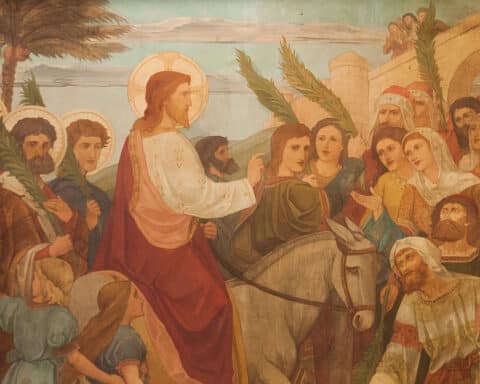
In the Acts of the Apostles, God reveals the wonder of wonders: God has chosen the entire human race to belong to him. Gentiles, those who were once outside the covenant now belong through the death and resurrection of Jesus: “Can anyone withhold the water for baptizing these people, who have received the Holy Spirit even as we have?” (Acts 10:47).
This tendency to celebrate the possible redemption of all humanity goes against our disordered hearts.
The heart that lines up early to get on an airplane, competing with our fellow citizens to get to our seats. The heart that struggles to rejoice in the promotion of a friend, when we ourselves remain “trapped” in the same job. The hardened heart. Christ’s resurrection promises the softening of this heart through the outpouring of love: “As the Father loves me, so I also love you” (Jn 15:9).
| Sixth Sunday of Easter May 6, 2018 |
|---|
|
ACTS 10:25-26, 34-35, 44-48
PS 98:1, 2-3, 3-4
1 JN 4:7-10
JN 15:9-17
|
This is not just any old love. It is the love that led God to create the world. It is the love that led God to choose Israel among all the nations, making her a bride “bedecked with jewels” (Is 61:10).
It is the love revealed in the fullness of time when the Word became flesh and dwelt among us. It is the love made manifest upon the cross, a love that entered into death itself. It is the love that conquered the darkness. A love that conquered sin. A love that ended the reign of death.
We have received this love. This infinite and absolute love. Divine love. To remain in this love means to keep God’s commandment. And what is this commandment? “Beloved, let us love one another, because love is of God” (1 Jn 4:7).
God’s generosity has been poured out upon the Church.
It is not a love that we could imagine. It’s not a love that we can easily grasp. Really, no act of love is. Who has ever deserved the love of their spouse? Who has ever earned the love of a child? Love is given.
And the Church is that place that contemplates this love, this total and absolute love, and offers it to the world: “This is my commandment: love one another as I have loved you” (Jn 15:12).
God chose us. God chose each of us. And our response to being chosen should not be a stinginess that too often infects the human heart. We are to love the world unto the end.
What does this love consist of? It is a love that preaches. It is a love that goes out to the margins, inviting the lonely into God’s life. It is a love that rejoices in the conversion of the sinner, in the mercy that the Church offers to the broken.
It is love. God’s love. In the end, human beings are too stingy. They don’t want to give this love by treating the Gospel as something without challenge. They don’t want to give this love by making it available only to those who earned it.
God doesn’t work like this. God challenges. God gives. God is love. Our task is to remain in this love, this love that has chosen us. And to bring every person on earth into this love: “Love one another.” Until all creation has become love itself.
After all, that’s the mystery of Easter.
Timothy P. O’Malley, Ph.D., is the managing director of the McGrath Institute for Church Life.





